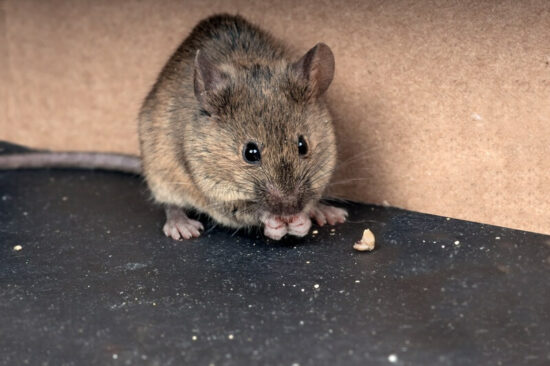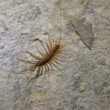Many homeowners want to know how long a mouse can live without food or water, and we understand their reasoning. If you don’t have any food or water in your home, then won’t mice simply leave?
Unfortunately, it’s not that simple.
This guide will cover how long these critters can live without food and water, and why you’ll likely want to think bigger when it comes to dealing with them.
Table of Contents
How Long Can A Mouse Live Without Food?
Mice that invade your home are usually after three things: food, water and shelter. If you are providing them with even one of these factors, then you can bet that they are going to settle in, have lots of babies and eventually become a real headache.
There are plenty of ways to deal with mouse issues, and many homeowners simply decide to call a pest control specialist. However, many others decide to try to tackle the problem themselves by using traps, baits or by eliminating the source of food.
- Designed to humanely capture mice without causing any harm
- The trap cage is easy to set up and use
- The trap cage has a large capacity, allowing it to trap multiple mice at once
- Made of high-quality materials that are durable and reusable
No matter what kind of removal method you settle on, it’s a good idea to get rid of any food that’s attracting mice to your home.
Part of coming up with a plan is to understand how long a mouse can live without food. Contrary to what you might think, mice can’t go very long without food. In fact, mice can only live between two and four days without food.
But it’s not that simple.
The challenge homeowners face is that mice can live on very little, so they won’t starve as long as they have even the tiniest crumb or morsel. That’s why it’s important to be diligent about scraps of food around the house.
Ways To Minimize How Much Food Mice Can Get In Your Home
Fortunately, there are things that you can do to minimize the amount of food that mice can find in your home. None of these preventative measures are difficult to do, but it’s very important to follow the steps very carefully.
Store Away Food
The first thing that you’re going to want to do is to make sure that all tempting food sources are stored in some kind of plastic, chew-proof containers. Baked goods, sugar, pasta, pet food, nuts and meat scraps are some of a mouse’s favorite snacks, so make sure that these items are securely stored away.
Expert Tip: You can use plastic ziploc bags for storing food items, but we highly suggest using sturdy plastic containers.
Keep It Clean
The next step, and one that should be followed on a daily basis, is to keep your home obsessively clean. We know that this sounds pretty extreme, but don’t forget that mice can live on even the smallest scrap of food that it finds. This means if you want them to be without food you should wipe down your kitchen counters several times a day, your floors should be routinely vacuumed and mopped, and all trash cans should be emptied regularly.
Mice won’t confine themselves to raiding the kitchen. If you and your family routinely snack in the living room or in bedrooms, then you can expect to see mice in these rooms as well. Try to minimize eating in these rooms and vacuum often.
Keep Your Pet Area Clean
If you have pets, then their food could be tempting mice to invade your home. Store pet food in air-tight containers, clean up their food area after each feeding and don’t leave uneaten food in their bowls.
Get Rid Of Bugs
Did you know that mice eat insects? Bugs might not be a mouse’s favorite snack, but they will eat them if they are desperate and searching for something to eat. If you see ants, roaches or other insects in your home, you’ll need to address those pests separately.
Will Mice Leave If They Have No Food?
Mice are very resourceful, and they will often find ways to survive (even in the most dire of conditions). This means even if you do your best to keep them without food, you may not actually force mice to leave your home.
- Designed to humanely capture mice without causing any harm
- The trap cage is easy to set up and use
- The trap cage has a large capacity, allowing it to trap multiple mice at once
- Made of high-quality materials that are durable and reusable
You’ll need to remove all unwanted sources of water as well.
You’re probably having an issue with mice because they found the food, shelter and water that they were looking for. This means that getting rid of their source of food is not going to be enough.
How Long Can A Mouse Live Without Water?
Most animals can’t live very long without water. However, mice can live for a week or longer without a water source. So even if you get rid of all visible and obvious sources of water in your home, a mouse can get the water it needs from any tiny bit of food or little drop of moisture that it may find.
What if you try your best to keep them without access to food in the home? Mice will often store food in places outside of your home, so if necessary, they can access these areas for the food that they need. They can also find water in puddles and water sources outside your home and come back inside.
Ways To Minimize How Much Water Mice Can Get In Your Home
Even if mice are still able to get the water they need outside, there are steps you can take to minimize how much water they can get from inside your home. In the same way that you need to keep your home scrupulously crumb-free, you will need to do your best to keep your home as free of water and moisture as possible.
Wipe Down Your Kitchen
It might be tempting to leave dishes soaking in the sink overnight (we’ve all been there), but doing so is giving mice a very direct source of water. In the long run, it is going to be well worth the extra effort to wash and dry all dishes before going to bed at night. If possible, try to do this after every meal.
Even the smallest bit of water or moisture in your sink can be enough to tempt a mouse and keep them going for a while, so make sure to wipe your sink and counter tops dry every night.
Monitor Your Pet’s Water Bowl
We realize that water is vital to your pet’s health, but this water could also be a factor in your mouse issue. In order to limit the amount of available water in your home, it’s a good idea to limit the number of water sources you provide your pets.
Mice don’t want to be anywhere near your pets if they can help it. In addition to the standard scents mice hate, the mere presence of pets will spook them. That means if your furry friends visit the same water bowl frequently, mice will be less likely to risk drinking from it.
If you have a large home and you have a number of water sources for your pet, mice might decide to try drinking from the ones that your pets use the least.
Check For Leaks And Drips
Condensation on pipes, leaking pipes or a dripping sink are things that will draw the attention of mice. Take the time to do a careful inspection of your home. This includes looking around your basement, if you have one, for any kind of leak or source of extra moisture.
Don’t Forget The Bathroom
Your bathroom is a very common place for mice to find the water they need. When you think about it, this makes sense. Toilets, sinks, bathtubs and showers are all about water.
So what can you do?
Make sure to keep the toilet seat closed and wipe down the sink and bath area after each use. The extra effort will be worth it in the long run.
Is It A Viable Removal Strategy To Starve Them?
If you’re thinking about keeping mice without food or water as your primary strategy for solving your mouse issue, then you’re going to want to make some adjustments. Starvation can be fairly successful when used in conjunction with other methods, but it’s not going to work on its own.
As we discussed earlier, even if you clean up all available crumbs, put food away in plastic containers and refrain from eating outside the dining area, mice often have food stashed away in places in your yard. They may eventually abandon the search inside for food, but this is not very likely. Once mice are in your house, they are usually there to stay.
It’s the same idea with water. You can try to eliminate all sources of water, but mice will either get the water they need from the food they find, or they will just go outside to get it.
Using the starvation method may help to eliminate your mouse issue, but it should not be thought of as a stand-alone solution. The best thing to do is to utilize a multi-pronged approach. Let’s take a quick look at a few of the other methods that can be used in conjunction with eliminating both food and water sources.
If you have a serious infestation, calling in professionals can make a big difference. Pest control experts have the knowledge and experience that’s needed to assess and manage your issue. They will also have access to chemicals and other products that will help you to reach a permanent solution to your mouse problem.
Another important step is to block up any entry points (even if there isn’t any food or water in your home). While you are going around your house looking for water leaks, drips and moisture, keep an eye out for places where the mice are getting in.
A variety of baits and mouse traps are available in most hardware and home improvement stores. Using these products can be a good supplement to the other methods we have mentioned, and there is one to suit just about every situation. Before using traps or bait, ask your exterminator if this is something you need to do. In many cases, a pest control specialist will use their own traps or bait.
Conclusion
Mice can live without food and water for a surprisingly long time, but that’s not what makes them such challenging pests to deal with. The amount of water and food they need to live is extremely small!
So while getting rid of excess food and water is absolutely the right move if you have a mouse problem, you should think about this as one piece of a larger pest control strategy. If you have any questions and want some feedback, let us know!



